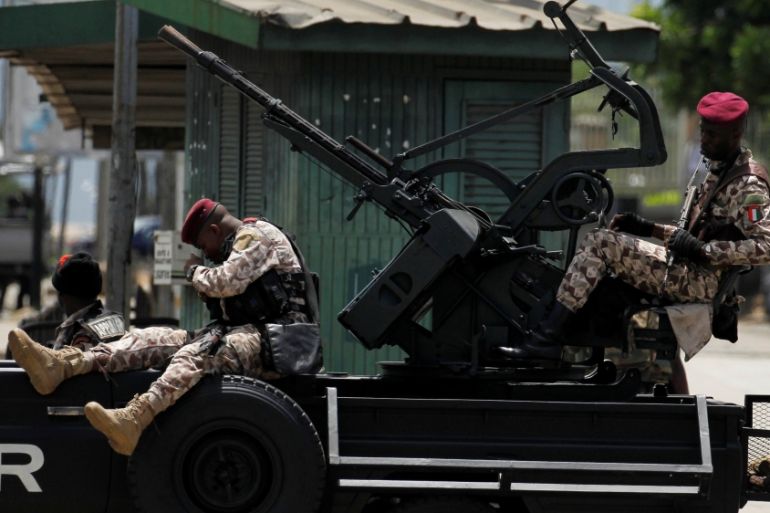Mutinying soldiers seal off Ivory Coast’s Bouake
Disgruntled troops cut off Bouake after staging fresh revolt over a pay dispute with the government.

Mutinying soldiers sealed off access to Ivory Coast’s second largest city of Bouake on Saturday, soldiers and residents said, as protests over a pay dispute with the government continued despite warnings of harsh punishments.
|
|
The unrest began in Bouake on Thursday before quickly spreading, following a pattern similar to a mutiny in January by the same group that paralysed parts of the West African country.
Keep reading
list of 4 itemsRussia-Ukraine war: List of key events, day 791
Biden signs law securing billions in US aid for Ukraine, Israel
Russia arrests deputy defence minister suspected of taking bribes
Mutinying soldiers, the majority of whom are ex-rebel fighters who helped bring President Alassane Ouattara to power, went a step further on Saturday, blocking roads leading north and south out of Bouake.
“We do not want to negotiate with anyone,” Sergeant Seydou Kone, one of the leaders of the uprising, said.
“We’re also ready to fight if we are attacked. We have nothing to lose,” he added.
The unrest broke out hours after national television broadcast a ceremony in which a spokesman for 8,400 mutinous soldiers apologised to Ouattara for a rebellion in January, and dropped demands for extra pay.
By Friday morning, disgruntled soldiers, firing guns in the air, had surrounded the military headquarters in Abidjan. Later in the day, armed soldiers sealed off all roads leading into Odienne.
READ MORE: Ivory Coast’s former first lady cleared of war crimes
Bouake residents said shops remained closed on Saturday as soldiers, many of them wearing balaclavas, fired their weapons in the air and patrolled the streets in stolen cars.
Kone said the mutineers were also active in the commercial capital Abidjan and the towns of Korhogo, Daloa, Man and Bondoukou. A Korhogo resident confirmed gunfire there and said access to the main military camp had been blocked.
Al Jazeera’s Ahmed Idris, reporting from Abidjan, said the situation remained largely calm in the commercial capital, but that was not the case in Korhogo and Bouake, where there were reports that shots had been fired at residents.
He added that some of the mutineers are “adamant, insisting that they must be paid the remaining amount of their allowances”.
Two options
In a statement broadcast on state television late on Friday, Military Chief of Staff General Sekou Toure threatened the soldiers with “severe disciplinary sanctions” if they did not end the revolt.
The government held an emergency meeting on Friday and said it will not negotiate with the mutinying troops.
Al Jazeera’s Nicolas Haque, reporting from Ouagadougou in neighbouring Burkina Faso, said President Alassane Ouattara wants to show he is in control of the armed forces.
“President Ouattara wants to stand firm. He wants to show to these mutineers, to the soldiers, to people in the Ivory Coast and to foreign investors that he’s in charge of the armed forces,” Haque said.
He added that there are only two options for the rebellious troops: “either return to the barracks or face action from the government”.
![The government has said it will not negotiate with the mutinying soldiers [Legnan Koula/EPA]](/wp-content/uploads/2017/05/37abdba3f6074fb991b366bb533e89bd_18.jpeg)
‘Very difficult time’
The latest revolt follows that of a similar mutiny in January that erupted in Bouake and spread to nine other cities.
The government then agreed to a deal that provided amnesty for the mutineers and agreed to pay each soldier 12m CFA francs ($19,950). The soldiers received 5m francs ($8,370) in January, and were due to get the rest of the sum this month.
|
|
But they said the government asked for a delay in payment to ease financial pressure on the treasury, citing a collapse in cocoa revenues.
Ivory Coast is the largest exporter of cocoa in the world and has had to shrink its national budget owing to falling prices.
The Ivory Coast was going through a “very, very difficult time”, the president said, after a fall in the price of cocoa.
The Ivorian army, which consists of about 22,000 soldiers, includes many former rebels who were integrated into the armed forces after years of conflict.
Ivory Coast was plunged into civil war in 2002 following a failed attempt to oust then-president Laurent Gbagbo.
The revolt sliced the former French colony into the rebel-held north and the government-controlled south and triggered years of unrest.
READ MORE: Ivory Coast leader dismisses security heads as PM quits
Gbago was forcibly removed from office in 2011 after he refused to accept Ouattara’s internationally recognised victory in a presidential election the year before. The rebels were then integrated into the army in a peace deal.
Last year, Ivory Coast launched an ambitious plan for the modernisation of the military, including an overhaul of personnel as well as purchases of material worth $1.3bn.
Part of the plan provides for the departure of several thousand men, particularly ex-rebels, who will not be replaced.